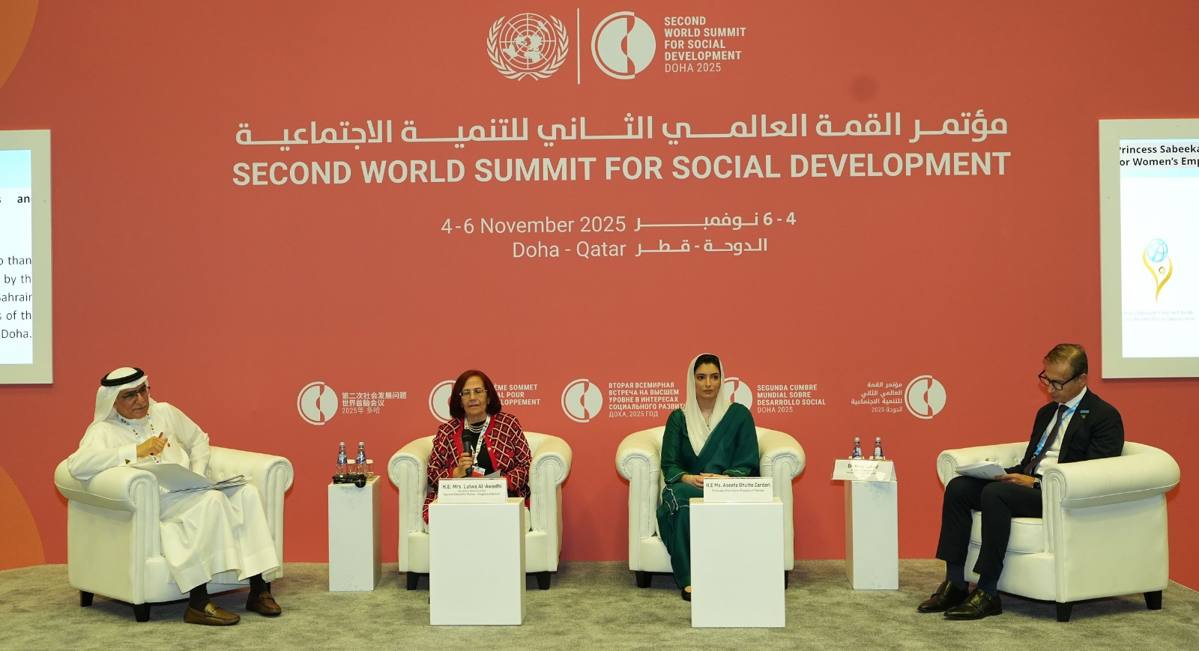SCW, UN Women introduce 3rd Princess Sabeeka bint Ibrahim Global Award at Second World Summit on Social Development

The Supreme Council for Women (SCW), in cooperation with UN Women, organised a side event to introduce the third edition of the Princess Sabeeka bint Ibrahim Al Khalifa Global Award for Women’s Empowerment. The session was held on the sidelines of the Second World Summit on Social Development, hosted by Doha, Qatar from November 4 to 6.
The event was attended by the First Lady of the Islamic Republic of Pakistan, Aseefa Bhutto Zardari, alongside heads and representatives of national women’s and family affairs mechanisms from GCC countries and several other nations.
In her opening remarks, Lulwa Saleh Al Awadhi, Secretary General of the SCW, welcomed the participants and outlined the origins of the award, which was adopted by UN Women and officially announced in its third edition in March 2025 during the sixty-ninth session of the UN Commission on the Status of Women in New York.
Al Awadhi explained that the award was launched as an initiative by Her Royal Highness Princess Sabeeka bint Ibrahim Al Khalifa, Consort of His Majesty the King and President of the SCW, following its success at the national level in advancing Bahraini women’s development and strengthening their status. The award was later adopted by UN Women in 2017 as a global platform recognising impactful efforts that promote women’s empowerment and equal participation in development worldwide.
Pakistan’s First Lady Aseefa Bhutto Zardari commended Her Royal Highness Princess Sabeeka’s initiative in launching a global award supporting women’s empowerment programmes. She highlighted the importance of such initiatives in advancing women’s roles and achieving equality of opportunity. She noted that women’s empowerment is not only a matter of justice but also a foundation for sustainable development, outlining Pakistan’s experience in this domain.
Dr. Moez Doraid, UN Women’s Regional Director for the Arab States and a member of the International Jury of the Global Award, delivered a presentation outlining the award’s objectives, criteria, and target groups, as well as the role of the international jury, which includes senior officials, academics, and experts in women’s affairs. He also reviewed the winning projects from the first and second editions, encouraging participants to take part in the third edition and benefit from the recognition it offers.
Dr. Maimoonah Khalil Al Khalil, Secretary General of the Family Affairs Council in the Kingdom of Saudi Arabia, also addressed the event. She commended Bahrain’s initiative in launching the Princess Sabeeka bint Ibrahim Al Khalifa Global Award for Women’s Empowerment, describing it as a pioneering effort that encourages international action to promote women’s participation in leadership and decision-making roles. She noted that the award’s transformation from a national to a global platform under UN Women’s adoption and international jury supervision has strengthened participation across the public, private, and civil society sectors.
Dr. Maimoonah Al Khalil added that such initiatives foster healthy competition that supports women’s advancement, highlights successful and replicable experiences, and facilitates knowledge exchange. She emphasised Saudi Arabia’s commitment to encouraging relevant national entities to participate in the award and showcase outstanding national achievements.

